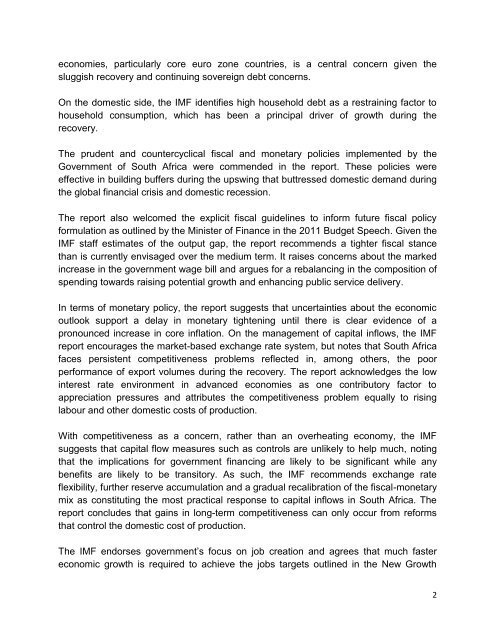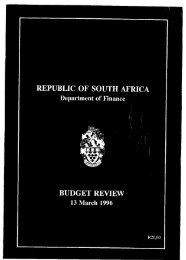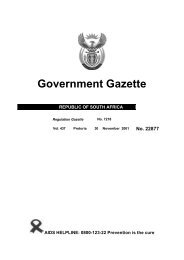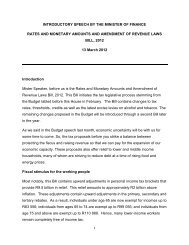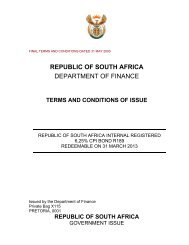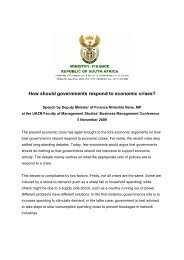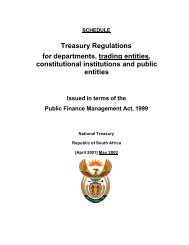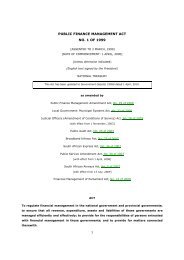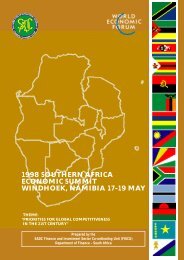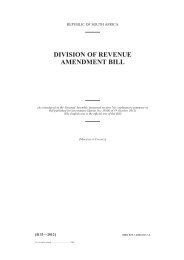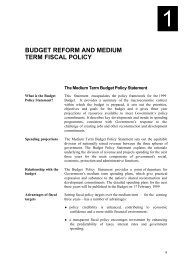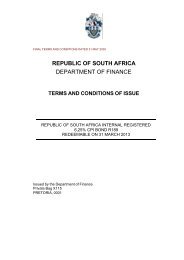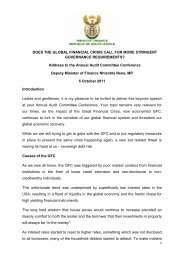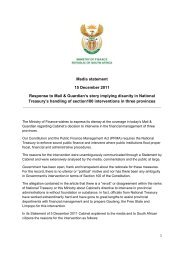THE INTERNATIONAL MONETARY FUND ... - National Treasury
THE INTERNATIONAL MONETARY FUND ... - National Treasury
THE INTERNATIONAL MONETARY FUND ... - National Treasury
You also want an ePaper? Increase the reach of your titles
YUMPU automatically turns print PDFs into web optimized ePapers that Google loves.
economies, particularly core euro zone countries, is a central concern given the<br />
sluggish recovery and continuing sovereign debt concerns.<br />
On the domestic side, the IMF identifies high household debt as a restraining factor to<br />
household consumption, which has been a principal driver of growth during the<br />
recovery.<br />
The prudent and countercyclical fiscal and monetary policies implemented by the<br />
Government of South Africa were commended in the report. These policies were<br />
effective in building buffers during the upswing that buttressed domestic demand during<br />
the global financial crisis and domestic recession.<br />
The report also welcomed the explicit fiscal guidelines to inform future fiscal policy<br />
formulation as outlined by the Minister of Finance in the 2011 Budget Speech. Given the<br />
IMF staff estimates of the output gap, the report recommends a tighter fiscal stance<br />
than is currently envisaged over the medium term. It raises concerns about the marked<br />
increase in the government wage bill and argues for a rebalancing in the composition of<br />
spending towards raising potential growth and enhancing public service delivery.<br />
In terms of monetary policy, the report suggests that uncertainties about the economic<br />
outlook support a delay in monetary tightening until there is clear evidence of a<br />
pronounced increase in core inflation. On the management of capital inflows, the IMF<br />
report encourages the market-based exchange rate system, but notes that South Africa<br />
faces persistent competitiveness problems reflected in, among others, the poor<br />
performance of export volumes during the recovery. The report acknowledges the low<br />
interest rate environment in advanced economies as one contributory factor to<br />
appreciation pressures and attributes the competitiveness problem equally to rising<br />
labour and other domestic costs of production.<br />
With competitiveness as a concern, rather than an overheating economy, the IMF<br />
suggests that capital flow measures such as controls are unlikely to help much, noting<br />
that the implications for government financing are likely to be significant while any<br />
benefits are likely to be transitory. As such, the IMF recommends exchange rate<br />
flexibility, further reserve accumulation and a gradual recalibration of the fiscal-monetary<br />
mix as constituting the most practical response to capital inflows in South Africa. The<br />
report concludes that gains in long-term competitiveness can only occur from reforms<br />
that control the domestic cost of production.<br />
The IMF endorses government’s focus on job creation and agrees that much faster<br />
economic growth is required to achieve the jobs targets outlined in the New Growth<br />
2


